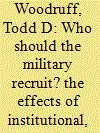|
|
|
Sort Order |
|
|
|
Items / Page
|
|
|
|
|
|
|
| Srl | Item |
| 1 |
ID:
155821


|
|
|
|
|
| Summary/Abstract |
The U.S. military spends millions of dollars and substantial institutional effort to understand enlistment motives and appropriately target incentives, recruiting effort, and marketing to prospective members. Similarly, researchers have worked for decades to identify, understand, and conceptualize enlistment motives. Much less effort has been made to understand the effect enlistment motives/goals have on individuals after they join. This research uses well-established enlistment motives/goals to identify and understand their effects on soldiers’ value to the military in terms of organizational identification and critical discretionary behaviors. Using multicohort cross-sectional data from future, initial training, and currently serving soldiers, this research finds that intrinsic enlistment motives/goals, such as altruistic service and self-enhancement, create greater relational and behavioral value than most extrinsic/economic enlistment motives/goals such as pay, gaining skills for future employment, and educational funding. Intrinsic enlistment motives/goals have a strong positive effect on perceptions of the organization, social satisfaction, organizational identification, and discretionary pro-organizational behaviors. Conversely, economic enlistment goals tend to be associated with higher levels of economic satisfaction but decreased organizational identification and pro-organizational behavior. Importantly, these effects tend to persist among soldiers who have been in the military for years. Contrary to the institutional–occupational framework, self-focused enlistment goals, both intrinsic and extrinsic, can creative substantial value for the military when they are aligned with organizational interests. Based on these findings, the practice of using enlistment motives/goals to maximizing enlistment without considering their long-term impact on relationship quality and behavior appears myopic and may fail to maximize long-term value for the military.
|
|
|
|
|
|
|
|
|
|
|
|
|
|
|
|
|
|
|
|
|